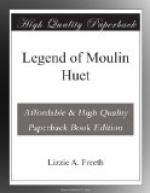So much for the Fairy lore in the Moulin Huet Chronicles; but we must turn our attention elsewhere to find out whose blood it was that thus dyed the watercourse of the Moulin Huet Mill.
At the time of which we are speaking, (the opening of the year 165-) Pierre Moullin and his two children, a son and a daughter, lived in a house adjoining the mill, in fact, the same roof covered both mill and house, which were built facing the sea. The stream of water which turned the wheel was far more powerful than the present, as the old marks (still partially visible) denote. Pierre Moullin, like many of his fellow-islanders, was a strong adherent of Cromwell; his son Hirzel was also,—though perhaps he did not go quite as far as his father in his hatred of the Royalist party. He had nevertheless acquaintances among the Royalist soldiers who were quartered in the strong fortress at Jerbourg. One in particular he had made a great friend of—Charlie Heyward. Old Pierre often used to say he knew harm would come of this friendship, and felt his words were being proved true when he discovered that an attachment was springing up between his daughter Marguerite and the young soldier. On becoming aware of this his rage was unbounded, and he repeatedly said he would be the death of Charlie if he could manage it. He tried in every way to bring his son to his way of thinking, but though Hirzel did not much like the idea of his sister marrying a Royalist soldier, and besides which another friend and fellow-countryman of his Jacques Gaultier, was also much attached to the fair Marguerite, and had long persecuted her with his unwelcome attentions, still Hirzel would have done anything rather than have injured his friend Charlie, whom he liked well, though he did not like his principles. In Jacques Gaultier the old miller saw a ready tool towards gaining his wicked end of destroying Charlie. The latter did not think Pierre’s hatred reached the extent it did, at the same time he was still aware there was no chance of his ever gaining the old man’s consent to his marrying Marguerite.
One night Pierre sent his son to bring Jacques Gaultier saying, he wished to speak to him about taking some flour into the town next day. Jacques was only too delighted to get any excuse for going to the mill, and immediately said he would accompany Hirzel if he “would wait until he got something which he had been making for Marguerite.”
“All right, Jacques, my boy, but look sharp, as the old man seems impatient to-night.”
“Thy tone and way of speaking savour far more of the style of that base soldiery which our island is burdened with, than the tone of thy father’s son should be,” replied Jacques.
“Very well,” said Hirzel, “I will promise to mend my ways, but do be quick, as I promised to walk with my sister at seven, and now it is nigh on half-past; and she says she needs my counsel much on a matter.”
“Ah! thou art an impatient lad, but it would be worse with me were I in thy case; long till she’d ask me to walk with her, not I warrant were I dying for a look at her sweet face.”




